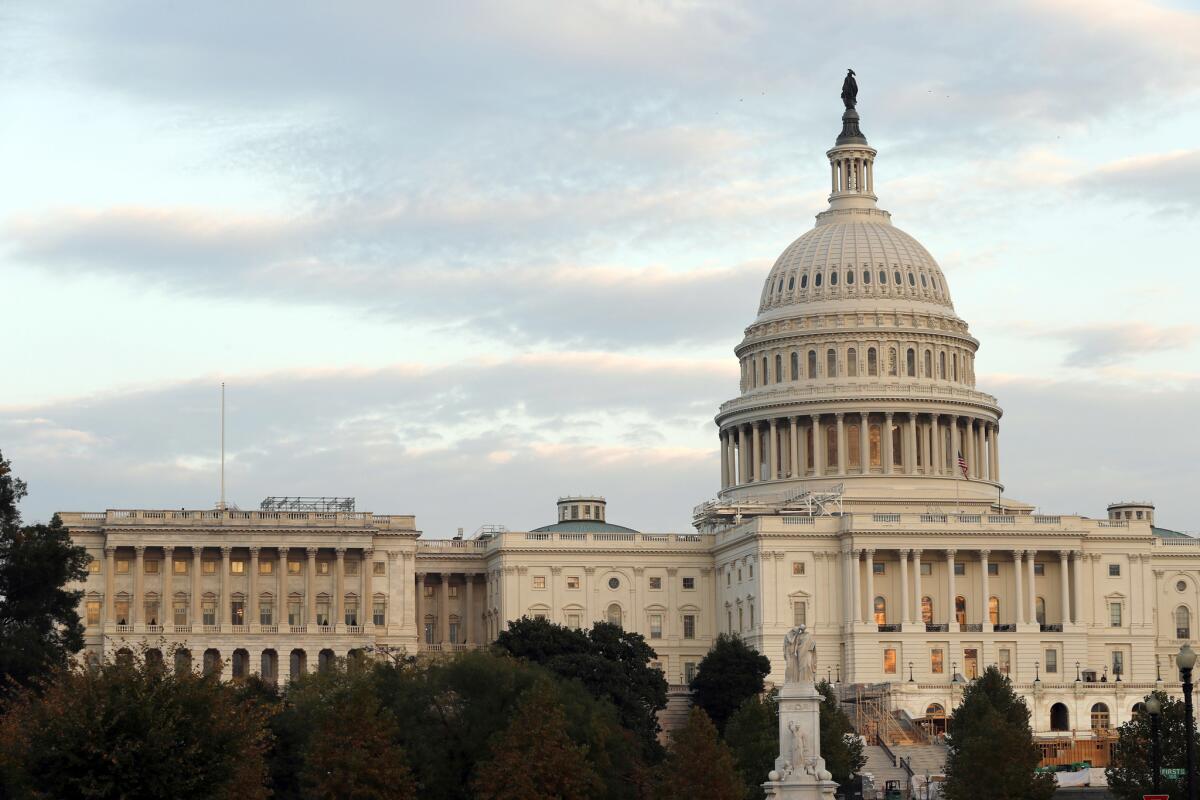Too many Americans believe a ‘coup’ or ‘force’ may be needed to protect their way of life

- Share via
Let’s check in on the state of American democracy.
About 1 in 4 U.S. respondents in a 2017 survey said that a military coup would be justified “when there is a lot of crime” or “when there is a lot of corruption,” according to Elizabeth J. Zechmeister, a political science professor at Vanderbilt University.
In a series of surveys conducted in 2017 and 2018, political science professors Nathan P. Kalmoe and Lilliana Mason found that more than 60% of Republicans and Democrats viewed the opposing party as “a serious threat to the United States and its people.” Democrats were slightly more likely (18%) to say that “violence would be justified” if the opposing side prevailed in the 2020 presidential election. About 40% of Democrats and Republicans agreed that the adherents of the opposing party were “not just worse for politics but downright evil.”
A 2019 Pew Research Center poll showed that nearly 60% of American respondents were “not satisfied” with the way their democracy was working.
Those are troubling numbers. Democracies depend on the consent, trust and participation of their citizens. Without faith in the electoral process, respect for the rule of law and a belief in the possibility of peaceful change through debate and compromise, democracy doesn’t function.
Now there are new data from Larry Bartels, a professor of public policy and social science at Vanderbilt University. His research, released late last month, involved only Republicans, but it too is deeply worrisome.
Bartels surveyed Republicans in January — before the emergence of COVID-19 in the U.S., before the death of George Floyd — and found that a majority of respondents agreed that “the traditional American way of life is disappearing so fast that we may have to use force to save it.” More than 40% agreed that “a time will come when patriotic Americans have to take the law into their own hands.” And 47% agreed that “strong leaders sometimes have to bend the rules in order to get things done.”
Bartels then tried to figure out what was driving these anti-democratic sentiments. Their views did not correlate most closely with the strength of their support for the GOP or their support for Trump or their educational level or where they lived. Nor with their level of economic or cultural conservatism.
The Republicans most willing to sanction such undemocratic actions, Bartels found, were those who also showed a marked “ethnic antagonism,” as he put it. The Republicans who were more likely to support “using force” to save their traditional way of life or who said patriots might have to “take the law into their own hands” were those who also agreed with such statements as “discrimination against whites is as big a problem today as discrimination against blacks and other minorities” and “things have changed so much I often feel like a stranger in my own country.”
What’s going on here? Weren’t we taught as schoolchildren that Americans overwhelmingly bought into the the country’s liberal tradition and the democratic principles on which it was built?
Even when Americans differed vehemently on politics and policy, the theory went, we nevertheless shared a basic agreement that our political system was the one we wanted to live under, and trusted in its capacity to move us in the right direction over time.
Of course there was always some exaggeration in that self-satisfied portrayal of American consensus. We did, for instance, fight the Civil War, and the United States has always had its flaws and deep divisions. But it seems fair to say that, through much of the 20th century, the vast majority of Americans shared a core belief in democracy and its rules.
Today, too many people in these surveys seem to find the democratic process expendable.
When I spoke with Bartels, he pointed out that the people he surveyed were unlikely to act on their anti-democratic beliefs. He noted that the “shaky allegiance of ordinary Americans to supposedly consensual democratic values” was hardly brand new — the social science literature on this goes back 50 years and then some. He’s not convinced there ever was a “golden age” in which the U.S. had a meaningful political consensus.
And in any case, polls are only polls and probably shouldn’t be considered the final arbiters in these matters.
Still, it can’t be healthy to have such sizable minorities — and in some cases, majorities — of people who don’t accept the basic rules of the game. The numbers suggest a fragility in our political system, and serve as a reminder that we can’t take democracy for granted. The post-Trump years — may they please come sooner rather than later — will require serious rebuilding work to restore Americans’ faith in the system.
But these problems don’t begin and end with President Trump. His dangerous disdain for institutions, laws and facts is undoubtedly exacerbating the situation. But he is as much a symptom of our fraying attachment to democracy as a cause, and it was partly his vocal contempt for historical norms that helped get him elected in the first place.
“I don’t think Trump created these attitudes,” Bartels said. “He has just managed to exploit them successfully.”
Bartels’ numbers show that racial resentment and looming demographic changes are playing a role in fomenting anti-democratic sentiment.
Unfortunately, government can’t function effectively if the democratic process and the rule of law are viewed as expendable.
More to Read
A cure for the common opinion
Get thought-provoking perspectives with our weekly newsletter.
You may occasionally receive promotional content from the Los Angeles Times.










